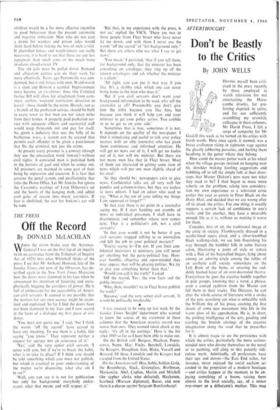Off the Record THE PRESS By DONALD McLACHLAN W HEN the
storm broke over the Attorney- General I was on the first lap of an inquiry (with no assistance from the Tribunals of Inquiry Act of 1921) into what Whitehall thinks of the press. I see that Mr Anthony Howard, late of the Sunday Times and now of the Observer, has de- scribed again in the New York Times Magazine how the doors were slammed in his face when he announced his intention of haunting and meta- phorically bugging the corridors of power. He is full of enthusiasm for the accessibility of Ameri- can civil servants. It seemed to me possible that the motives for our own secrecy might be exam- ined and explained. So far I find the doors have not been slammed in my face and I now record in the form of a dialogue my first piece of evi- dence.
'You must not quote me,' I said, 'but I think the words "off the record" have ceased to have any meaning. To use them is a habit, like saying "you know." They represent neither a request for secrecy nor an assurance of it.'
'Yes,' said the very senior civil servant, 'I agree with you, but if we're to break the habit, what is to take its place? If I think you should be told something which you must not publish, but which is essential to your understanding of the matter we're discussing, what else am I to say?'
'Well, you can say it is not for publication but only for background; everybody under- stands what that means and will respect it.'
`But that, in my experience with the press, is not so,' replied the VSCS. 'There are two or three people from Fleet Street who have never let me down, and with them I never use the words "off the record" or "for background only." But there are others who use what I say to get news.'
'You mean,' I persisted, 'that if you tell them, for background only, that the minister has been consulting an astrologer, they ring up all the known astrologers and ask whether the minister is a client.'
'All right, you can put it that way if you like. It's a shabby trick which one can never bring home to the man who does it.'
'But if you civil servants don't want your background information to be used, why tell the journalist at all? Presumably you don't give him the titbit because you like him, but because you think it will help you and your minister to get your policy across. You confide in us to get us on your side.'
'Sometimes that is true, sometimes it is not. It depends on the quality of the newspaper. I find it stimulating and useful to talk over policy matters with an able journalist who has given them continuous and informed attention. He will get no news out of it; I will get no kudos out of it, nor will my minister. But there are not many men like that in Fleet Street. Most of them are interested in getting some item of news which will put one man slightly ahead of his rival.'
`So they should be: newspapers exist to give news. Confidential talks are all very well for pundits and column-writers, but they are useless tO news editors. I had an editor who used to say, "What is the use of your telling me things I am supposed to forget?"' 'In that case there is no point in a journalist seeing me. If I start handing out crumbs of news to individual pressmen, I shall have to discriminate and remember whose turn comes next. That is a politician's job, not a civil servant's.'
'In that case would it not be better if you civil servants stopped talking to us journalists and left the job to your political masters?'
'You're saying it—I'm not. If you limit con- fidential interviews to ministers, you will never get anything but the party-political line. How- ever humble, objective and open-minded they may appear, they will be playing politics. We try to give you something better than that.'
'Would you call it the truth?' I asked 'Off the record, Yes: the true facts and the public interest.'
'Why, then, shouldn't we in Fleet Street publish the truth?'
'Because,' said the very senior civil servant, 'it would be politically intolerable.'
I was amused to be rung up last week by the Sunday Times 'Insight' department who wanted to know the source of my statement in these columns that the American security record was worse than ours. They seemed taken aback at my reply: 'it's all in the cuttings.' Here is the list since 1945 so far as I have been able to make out.
On the British roll: Burgess, Maclean, Ponte- corvo, Nunn, May, Fuchs, Burchell, Lonsdale, the Krogers. Houghton, Gee, Blake, Vassall and Bossard. Of these, Lonsdale and the Krogers had escaped from the United States.
On the American roll: Hiss, Soble, Soblen, Gold, the Rosenbergs, Slack, Greenglass, Brothman, Moskowitz, Abel, Coplon, Martin and Mitchell (the cypher clerks who defected), Hayhanen, Scarbeck (Warsaw diplomat), Bucar, and now there is a charge against Sergeant Boeckenhaupt.


































 Previous page
Previous page